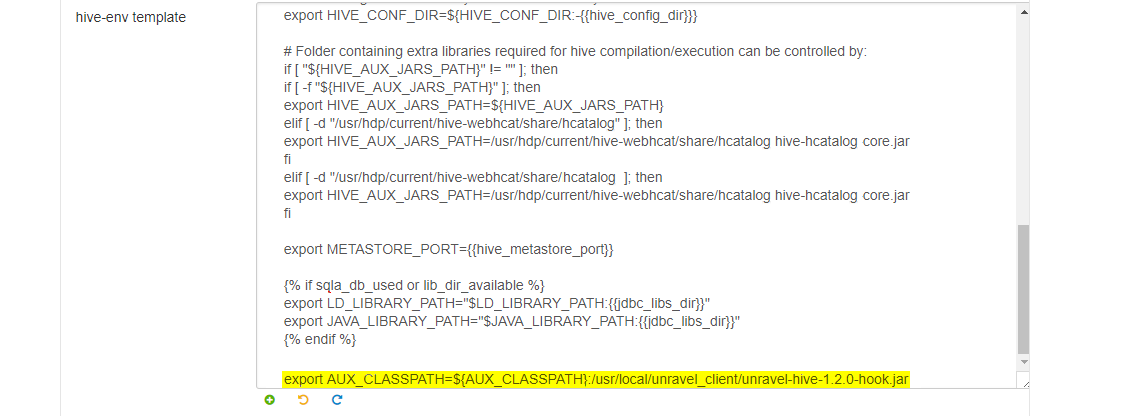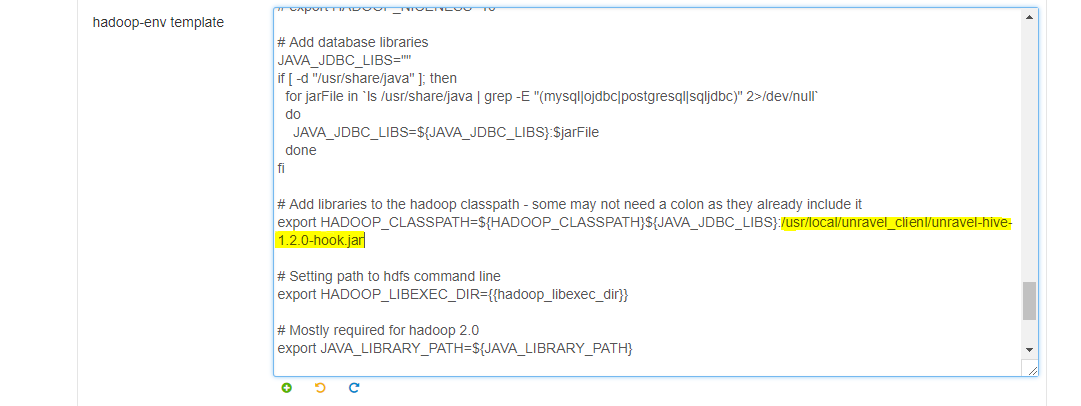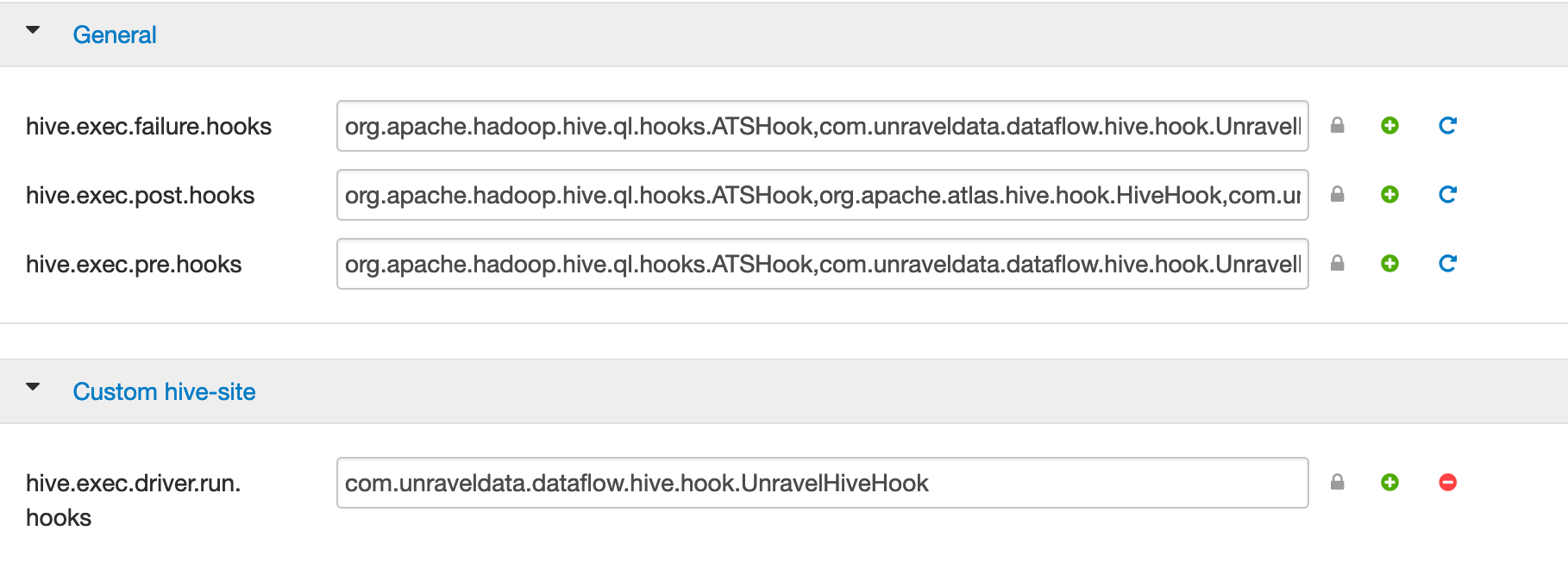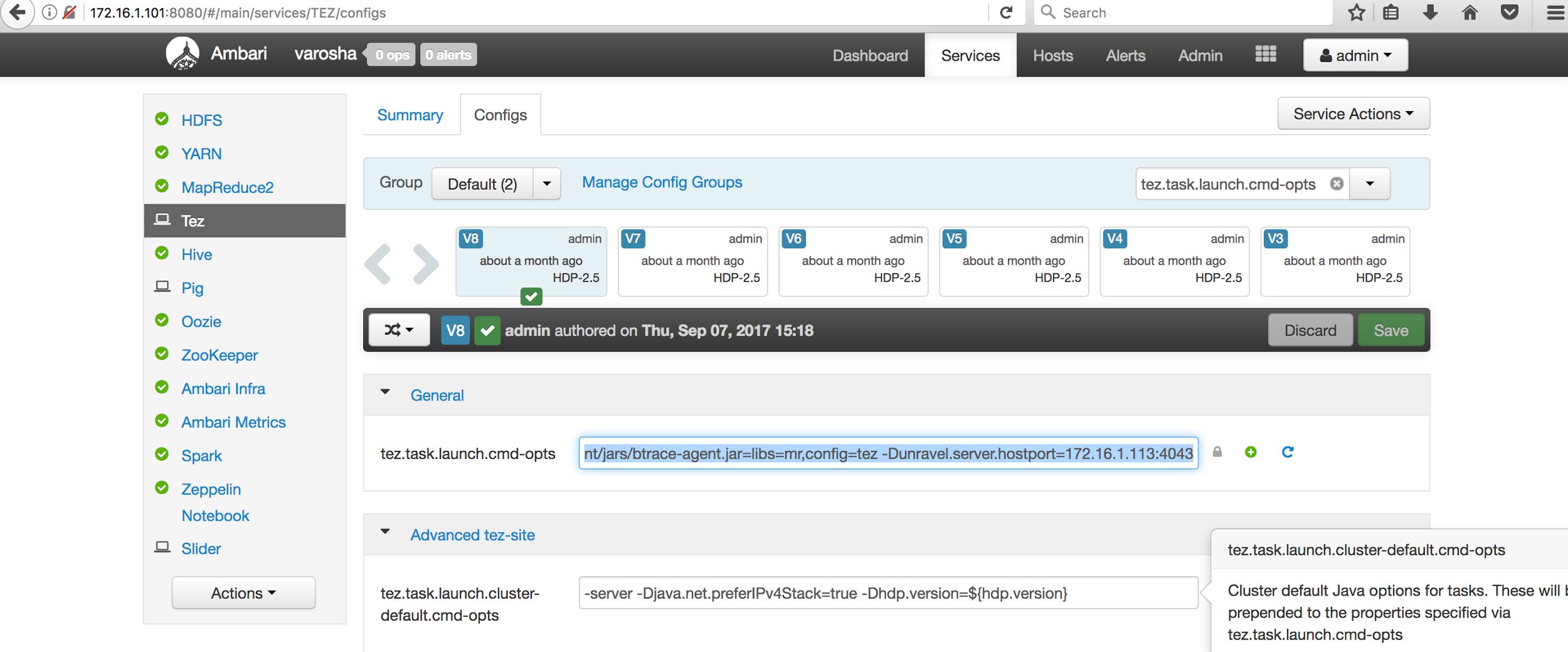Part 2: Enabling Additional Instrumentation
This topic explains how to configure Unravel to retrieve additional data from Hive, Tez, Spark and Oozie, such as Hive queries, application timelines, Spark jobs, YARN resource management data, and logs.
1. Generate and Distribute Unravel's Hive Hook and Spark Sensor JARs
In order to enable additional instrumentation, first generate Unravel's JARs and distribute them to every edge in the cluster which runs queries. Later, after JARs are distributed to the nodes, we'll walk you through integrating Hive, Tez, and Spark with Unravel.
On Unravel Server, log in as
rootand confirm that wget is installed.yum install -y wget
Run the following commands:
mkdir /usr/local/unravel-jars chmod 775 -R /usr/local/unravel-jars/ chown root:hadoop /usr/local/unravel-jars/ cd /usr/local/unravel/install_bin/cluster-setup-scripts/ chmod +x /usr/local/unravel/install_bin/cluster-setup-scripts/unravel_hdp_setup.py sudo python2 unravel_hdp_setup.py --sensor-only --unravel-server
unravel-host:3000 --spark-versionspark-version--hive-versionhive-version--ambari-serverambari-hostcp /usr/local/unravel_client/unravel-hive-1.2.0-hook.jar /usr/local/unravel-jars/ cp -pr /usr/local/unravel-agent/jars/* /usr/local/unravel-jars/Tip
For
unravel-host, specify the protocol (http or https) and use the fully qualified domain name (FQDN) or IP address of Unravel Server. For example,https://playground3.unraveldata.com:3000.Files are installed locally in these two directories:
/usr/local/unravel_client(Hive Hook JAR)/usr/local/unravel-agent/jars/(Resource metrics sensor JARs)
Make a note of these directories because you'll need to specify them in Ambari.
Distribute
/usr/local/unravel_clientand/usr/local/unravel-agent/jars/to all worker, edge, and master nodes which run queries.For example,
scp -r /usr/local/unravel_client/ root@
every-cluster-host:/usr/local/unravel-jars scp -r /usr/local/unravel-agent/ root@every-cluster-host:/usr/local/unravel-jarsOn each instrumented node, do the following:
Make sure the node can reach port 4043 of Unravel Server.
Add Unravel's binaries to the
*CLASSPATHenvironment variables.export AUX_CLASSPATH=${AUX_CLASSPATH}:/usr/local/unravel-jars/unravel-hive-1.2.0-hook.jar export HADOOP_CLASSPATH=${HADOOP_CLASSPATH}:/usr/local/unravel-jars/unravel-hive-1.2.0-hook.jar
2. For Oozie, Copy the Hive Hook and BTrace JARs to the HDFS Shared Library Path
Copy the Hive Hook JAR, /usr/local/unravel_client/unravel-hive-1.2.0-hook.jar and the Btrace JAR, /usr/local/unravel-agent/jars/btrace-agent.jar to the HDFS shared library path specified by oozie.libpath. If you don't do this, jobs controlled by Oozie 2.3+ will fail.
3. Add Unravel's Binaries to CLASSPATH in Ambari
Adjust Hive and Hadoop configurations in Ambari to allow these JARs to be picked up by Hive Hook and Hadoop.
Add
AUX_CLASSPATHto Ambari's hive-env template:In Ambari, click Hive | Configs | Advanced | Advanced hive-env.
Inside the Advanced hive-env template, towards the end of line, add:
export AUX_CLASSPATH=${AUX_CLASSPATH}:/usr/local/unravel-jars/unravel-hive-1.2.0-hook.jar
Add
HADOOP_CLASSPATHto Ambari's hadoop-env template:In Ambari, click HDFS | Configs | Advanced | Advanced hadoop-env.
Inside the hadoop-env template, look for export HADOOP_CLASSPATH and append Unravel's JAR path:
export HADOOP_CLASSPATH=${HADOOP_CLASSPATH}:/usr/local/unravel-jars/unravel-hive-1.2.0-hook.jar
4. Connect Unravel Server to Hive
Warning
Completion of this step requires a restart of all affected Hive services in Ambari Web UI.
In Ambari's general properties, append a comma with no space, followed by
com.unraveldata.dataflow.hive.hook.UnravelHiveHook, to the following properties:hive.exec.failure.hooks hive.exec.post.hooks hive.exec.pre.hooks For example,
hive.exec.pre.hooks=
existing-value,com.unraveldata.dataflow.hive.hook.UnravelHiveHook hive.exec.post.hooks=existing-value,com.unraveldata.dataflow.hive.hook.UnravelHiveHook hive.exec.failure.hooks=existing-value,com.unraveldata.dataflow.hive.hook.UnravelHiveHook
In Ambari's custom hive-site editor, do the following:
Add a property, hive.exec.driver.run.hooks, and set its value to
hive.exec.driver.run.hookSet com.unraveldata.host: to
unravel-gateway-internal-IP-hostnameSet com.unraveldata.hive.hook.tcp to
trueIf you have an Unravel version older than 4.5.1.0, set com.unraveldata.hive.hdfs.dir to
/user/unravel/HOOK_RESULT_DIR.
For example,

If LLAP is enabled, copy the above settings in Custom hive-interactive-site to
/etc/hive/conf/hive-site.xml.Tip
Edit hive-site.xml manually, not through Ambari Web UI.
If LLAP is enabled, copy the settings from Advanced hive-interactive-env to
/etc/hive/conf/hive-site.xml.Tip
Edit
hive-site.xmlmanually, not through Ambari Web UI.If you have an Unravel version older than 4.5.1.0, create an HDFS Hive hook directory for Unravel:
hdfs dfs -mkdir -p /user/unravel/HOOK_RESULT_DIR hdfs dfs -chown unravel:hadoop /user/unravel/HOOK_RESULT_DIR hdfs dfs -chmod -R 777 /user/unravel/HOOK_RESULT_DIR
5. Configure the Application Timeline Server (ATS)
If you're not running Tez, skip this step.
If ATS requires authentication, set these properties iIn
/usr/local/unravel/etc/unravel.properties:In Ambari, add these settings:
In
yarn-site.xml:yarn.timeline-service.enabled: true yarn.timeline-service.entity-group-fs-store.group-id-plugin-classes: org.apache.tez.dag.history.logging.ats.TimelineCachePluginImpl
If yarn.acl.enable is
true, addunravelto yarn.admin.acl.In
hive-site.xml, append these values to the following parameters:hive.exec.failure.hooks: org.apache.hadoop.hive.ql.hooks.ATSHook hive.exec.post.hooks: org.apache.hadoop.hive.ql.hooks.ATSHook hive.exec.pre.hooks: org.apache.hadoop.hive.ql.hooks.ATSHook
In
hive-env.sh, add:Use ATS Logging: true
In
tez-site.xml, add:tez.history.logging.service.class: org.apache.tez.dag.history.logging.ats.ATSV15HistoryLoggingService tez.am.view-acls:
unravel-"run-as"-user or *
In Ambari, restart all services whose components you changed.
6. Connect Unravel Server to Tez
If you're not running Tez, skip this step.
Add these properties to
/usr/local/unravel/etc/unravel.properties:Confirm that hive.execution.engine is set to
tez.set hive.execution.engine=tez;
Using the Ambari, configure the Btrace agent for Tez:
Append the Java options below to tez.am.launch.cmd-opts and tez.task.launch.cmd-opts:
-javaagent:/usr/local/unravel-agent/jars/btrace-agent.jar=libs=mr,config=tez -Dunravel.server.hostport=
unravel-host:4043For example,


Restart the affected component(s). The screenshot below illustrates this change.
Note
In a Kerberos environment you need to modify tez.am.view-acls property with the "run as" user or *.

Confirm that Unravel UI shows Tez data.
Run
/usr/local/unravel/install_bin/hive_test_simple.shon the HDP cluster or on any cloud environment wherehive.execution.engine=tez.Check Unravel UI for Tez data.
Unravel UI may take a few seconds to load Tez data.
In Ambari, restart all affected Hive services.
7. (Optional) Connect Unravel Server to Spark-on-YARN
Warning
Completion of this step requires a restart of all affected Spark services in Ambari UI.
Tip
For unravel-host, use Unravel Server's fully qualified domain name (FQDN) or IP address.
Tell Ambari where the Spark JARs are:
In Ambari Web UI, on the left side, click Spark | Configs | Custom spark-defaults | Add Property and use
 Bulk property add mode, or edit
Bulk property add mode, or edit spark-defaults.confas follows:Tip
If your cluster only has one Spark 1.X version,
spark-defaults.confis in/usr/hdp/current/spark-client/conf.If your cluster is running Spark 2.X,
spark-defaults.confis in/usr/hdp/current/spark2-client/conf.
The example below uses default locations for Spark JARs. Your environment may vary.
spark.unravel.server.hostport=
unravel-host:4043 spark.driver.extraJavaOptions=-javaagent:/usr/local/unravel-agent/jars/btrace-agent.jar=config=driver,libs=spark-versionspark.executor.extraJavaOptions=-javaagent:/usr/local/unravel-agent/jars/btrace-agent.jar=config=executor,libs=spark-versionspark.eventLog.enabled=trueEnable Spark streaming.
Spark streaming is disabled by default. To enable it, edit
spark-defaults.confas follows.Search for
spark.driver.extraJavaOptionsand set it to the following value. Be sure to substitute the correct version of Spark forspark-version.spark.driver.extraJavaOptions=-javaagent:${unravel-sensor-path}/btrace-agent.jar=script=DriverProbe.class:SQLProbe.class:StreamingProbe.class,libs=spark-versionNote
The value of spark.driver.extraJavaOptions changes based on whether Spark streaming is enabled or disabled.
Unravel supports the Spark streaming feature for Spark 1.6.x, 2.0.x, 2.1.x and 2.2.x only.
Unravel has limited support for Spark apps using the Structured Streaming API introduced in Spark2.
Next Steps
For additional configuration and instrumentation options, see Next steps.